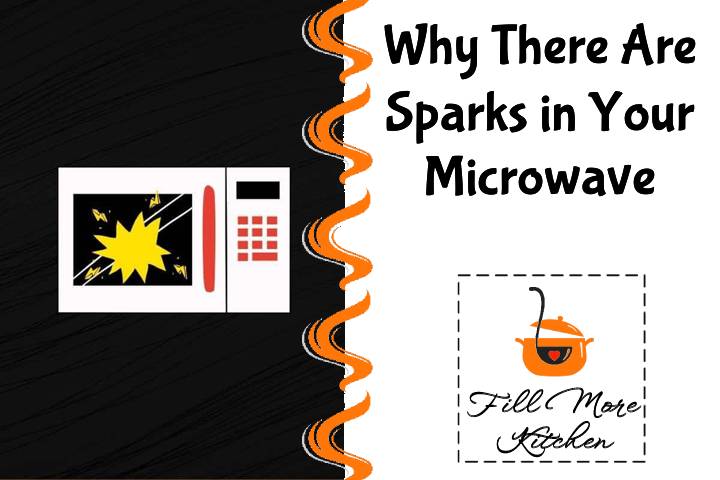Most individuals use a microwave as a contemporary convenience to warm up or prepare specific food items; however, if you have encountered sparks while cooking in your microwave, you are aware of how alarming it can be.
It is common to question the reason behind the occurrence of sparks in your microwave.
There are various reasons why sparks occur inside a microwave, such as the presence of metal, a waveguide cover that is unclean, certain food ingredients, and defective components. The primary cause of sparks in microwaves is the introduction of metal objects, which causes electrons to move quickly and generate charged particles that produce sparks.
If you experience sparks in your microwave, identifying and resolving common issues can help you determine the cause and prevent future occurrences. Each cause requires a different solution, which we will explain.
Continue reading to learn about the possible reasons behind microwave sparks, ways to avoid them, and whether they pose a risk to you or your appliance.
What Materials Cause Microwaves to Spark?
It is crucial to comprehend that not all materials are safe for microwaving when considering items that can be placed in a microwave.
Sparks can occur in microwaves when certain substances mix with the electromagnetic waves emitted by the appliance.
There are several substances that can produce sparks in a microwave:
- Metal Utensils: If you leave a metal utensil inside your cup or plate while microwaving, it will result in the production of sparks due to the interference between the metal and electromagnetic waves, which leads to the pulsation of electricity between them.
- Metallic Dishes: Sparks can be produced in the microwave due to the presence of even a tiny amount of metal on dishes, so it is crucial to be mindful of the composition of your dishes and whether they are labeled as safe for use in microwaves.
- Aluminum Foil: When placed in the microwave, aluminum foil, a frequently used household item for wrapping leftovers, can be hazardous due to its metallic composition despite being thin as paper. It is crucial to eliminate any aluminum foil from your leftovers before microwaving them.
- Steel Wool: Although steel wool is a commonly used item for cleaning tough stains in the kitchen, it should not be used to clean a microwave as it can break off and become lodged in small crevices of the unit, leading to sparks during its next use.
- Certain Fruits and Vegetables: Certain types of fruits and vegetables contain minerals that can generate sparks when microwaved, which is influenced by their growth conditions and soil type. Moreover, grapes with their high water content can create not only sparks but also a plasma ball.
Is It Safe to Use a Sparking Microwave?
If your microwave is producing sparks, it can be dangerous for both you and the appliance, so it’s advisable to avoid using it until you have identified the cause.
Sparking in the microwave is usually a result of an easily fixable issue, such as the presence of a substance that should not be inside the appliance.
If you find sparks in your microwave, it could be due to the presence of a metal utensil that was accidentally left inside, but once you remove the utensil, it is safe to use the microwave again.
It is possible that the reason for the sparks in your microwave is due to the presence of metal in the dish you are using.
One way to determine if the dish is causing the sparks in your microwave is by replacing it with another item and observing if the sparks still occur, and if they don’t, then it should be safe to continue using your appliance.
If you cannot identify any obvious cause for the sparking in your microwave after inspection, it is not safe to continue using it and you should unplug it until a professional inspects it or you find the root cause.
Why Does My Microwave Spark With No Metal Inside?
Sparks in your microwave can occur even if there is no metal present inside the unit, and this can be attributed to several factors such as a damaged waveguide cover or a defective diode.
The waveguide in your microwave, which is responsible for transmitting electromagnetic waves to cook your food, is protected by the waveguide cover from any debris such as food particles or steam that may damage the electronics of the unit.
If the waveguide cover gets damaged, the electronics lose their protection and may get damaged by the buildup of food particles, steam, and debris on the waveguide, leading to sparks.
Moreover, in the rare event that your microwave experiences a defective diode, it can be the main cause of sparks in your appliance.
Diodes are responsible for generating the waves that heat up your food in the microwave. In case of any harm to them, you may observe sparks, which can lead to the complete shutdown of your appliance.
Lastly, a microwave can also spark if you have mistakenly initiated the appliance while it is empty. Since the unit operates on electromagnetic energy, it is intended to come from the device to the food to initiate the cooking process.
Empty microwaves can cause sparking because the waves bounce off the unit.
Why Do Certain Foods Cause Sparks in the Microwave?
If your microwave is producing sparks, it could be due to certain foods that are high in water content or soils containing minerals that react with the electromagnetic waves produced by the microwave.
It may seem strange, but some foods can create sparks in a microwave, depending on their composition. Foods with higher water content are more prone to causing sparking in the appliance.
Fruits and vegetables can cause a reaction to the electromagnetic waves emitted during the cooking process, particularly those with higher water content.
Moreover, certain vegetables may produce sparks in the microwave, primarily because of the soil they are cultivated in. This is due to specific minerals present in the soil that can lead to sparking when microwaved.
What Can I Do to Prevent Sparks in the Microwave?
Preventing sparks in your microwave oven is easy and involves common sense measures such as avoiding the use of metal objects and regularly cleaning the appliance.
It can be easy to accidentally leave a utensil in your cup of tea when you put it in the microwave due to being busy with multiple tasks, but it’s important to remember that these small mistakes can lead to expensive consequences if not taken care of.
Verifying that the dish you are placing in the microwave is marked as “microwave-safe” can also avert sparks from occurring in your appliance, which is frequently overlooked but can be beneficial in avoiding future problems.
Regularly cleaning your microwave can prevent food particles from entering unwanted areas and ensure its proper functioning for an extended period.
It is crucial to be mindful of the cleaning supplies you use when cleaning your microwave, as metal-based products like steel wool should be avoided at all costs to prevent any fragments from breaking off and being left behind.
Can Sparks Damage a Microwave?
Although sparks in your microwave may not pose an immediate danger to you, they can cause long-term harm to the unit by harming essential components like the waveguide cover and diodes.
Sparks in the microwave usually jump from the source of the sparks to the microwave itself.
When sparks occur in a microwave, it can lead to permanent damage of the waveguide cover, which can cause more sparks and ultimately result in the appliance becoming non-functional.
Moreover, when the waveguide cover is impaired, it can cause the sparks to penetrate through the waveguide and reach the diodes, resulting in irreparable damage to the microwave.
You can also check this video about “Why There Are Sparks in Your Microwave”
Check out our top 10 reviews!
Related posts
https://fillmorekitchen.com/can-you-use-roasting-bags-in-a-halogen-oven/
https://fillmorekitchen.com/best-milk-frother-for-oat-milk/
https://fillmorekitchen.com/whats-the-difference-between-japanese-and-chinese-food/
https://fillmorekitchen.com/instant-pot-the-non-toxic-pressure-cooker-are-they-safe/
https://fillmorekitchen.com/best-ways-to-reheat-taco-bell-burritos/



